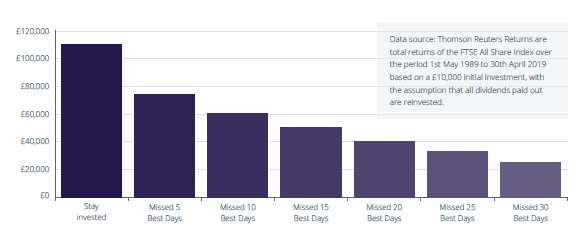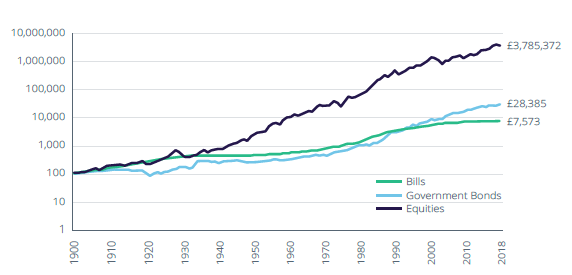
Investing for the long-term gives your money the greatest chance of growing in value. But this means holding your nerve during periods of significant stock market volatility and remembering that, as history shows, markets will recover.
As the old investment adage goes, it’s time in the market – not timing the market which is key to returns.
By delaying, or cashing in your investments, you risk missing out on the best days in the market.
The global economy has endured plenty of adversity over the decades, and yet the stock market has continued to climb, given time.

Compounding is extremely powerful when it comes to investing. Albert Einstein apparently described it as the eighth wonder of the world. It is, simply, earning returns on your returns.
For example, somebody earning a 5% return in year one would see their investments grow by a compounded return of 63% after 10 years.
After 20 years, this rises to 165%, and over 25 years it balloons to 239%. This demonstrates the cumulative effects that compounding has on capital.
Savings accounts typically struggle to keep pace with inflation, seeing savers lose value in ‘real’ terms. In the graph below, bills are short-dated bonds which give an indication of what returns on cash might have been.

Returns are in nominal sterling terms, are annualised and gross income is reinvested during the period 1900 to 2018 based on a #100 initial investment. [1]
If you are prepared to accept the risk that comes with investing, and have time on your side, you give your wealth the greatest chance of growing and beating inflation over the long term.
All of Fairstone’s portfolios are well diversified. This means that your investments (and risk) is spread across different assets, across the globe – including equities, bonds and cash.
Different assets typically will not react in the same way to sudden economic shocks, so a combination will limit how much your portfolio ebbs and flows in value. Over time, this reduces the impact of volatile periods on your investments’ overall performance.
Find out more about diversification here.
| Match me to an adviser | Subscribe to receive updates |
[1] Source: E Dimson, PR Marsh and M Staunton, Global Investment Returns Database 2019 (distributed by Morningstar Inc.) Indices are described in E Dimson, PR Marsh, and M Staunton, Credit Suisse Global Investment Returns Yearbook 2019 (available from London Business School).